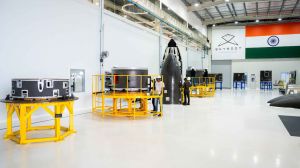Saudi king drives change in desert
The king has broken taboos, declaring that the Arabs have fallen critically behind much of the modern world.

On a marshy peninsula 50 miles from this Red Sea port, King Abdullah of Saudi Arabia is staking $12.5 billion on a gargantuan bid to catch up with the West in science and technology. Between an oil refinery and the sea, the monarch is building from scratch a graduate research institution that will have one of the 10 largest endowments in the world, worth more than $10 billion.
Its planners say men and women will study side by side in an enclave walled off from the rest of Saudi society, the country’s notorious religious police will be barred and all religious and ethnic groups will be welcome in a push for academic freedom and international collaboration sure to test the kingdom’s cultural and religious limits.
This undertaking is directly at odds with the kingdom’s religious establishment, which severely limits women’s rights and rejects coeducation and robust liberal inquiry as unthinkable.
For the new institution, the king has cut his own education ministry out the loop, hiring the state-owned oil giant Saudi Aramco to build the campus, create its curriculum and attract foreigners.
Supporters of what is to be called the King Abdullah University of Science and Technology, or Kaust, wonder whether the king is simply building another gated island to be dominated by foreigners, like the compounds for oil industry workers that have existed here for decades, or creating an institution that will have a real impact on Saudi society and the rest of the Arab world.
“There are two Saudi Arabias,” said Jamal Khashoggi, the editor of Al Watan, a newspaper. “The question is which Saudi Arabia will take over.”
The king has broken taboos, declaring that the Arabs have fallen critically behind much of the modern world in intellectual achievement and that his country depends too much on oil and not enough on creating wealth through innovation.
“There is a deep knowledge gap separating the Arab and Islamic nations from the process and progress of contemporary global civilisation,” said Abdallah S Jumah, the chief executive of Saudi Aramco. “We are no longer keeping pace with the advances of our era.”
Traditional Saudi practice is on display at the biggest public universities, where the Islamic authorities vet the curriculum, medical researchers tread carefully around controversial subjects like evolution, and female and male students enter classrooms through separate doors and follow lectures while separated by partitions.
Old-fashioned values even seeped into the carefully staged groundbreaking ceremony on Sunday for King Abdullah’s new university, at which organisers distributed an issue of the magazine The Economist with a special advertisement for the university wrapped around the cover. State censors had physically torn from each copy an article about Saudi legal reform titled Law of God Versus Law of Man, leaving a jagged edge.
Despite the obstacles, the king intends to make the university a showcase for modernisation. The festive groundbreaking and accompanying symposium about the future of the modern university were devised partly as a recruiting tool for international academics.
“You have to create an environment where you can connect to the outside world,” said Professor Ghoniem, who is from Egypt. “You cannot work in isolation.”
From a laconic monarch known for his austerity, the pomp, along with a rare speech by the king himself, was intended to send a strong signal, according to the team charged with building and staffing the new campus within two years.
The king is lavishing the institution not only with money, but also with his full political endorsement, intended to stave off internal challenges from conservatives and to win over foreign scholars who doubt that academic freedom can thrive here.
- 01
- 02
- 03
- 04
- 05































